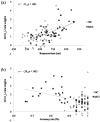Altered Brain Activities Associated with Neural Repetition Effects in Mild Cognitive Impairment Patients
- PMID: 27176074
- PMCID: PMC5497488
- DOI: 10.3233/JAD-160086
Altered Brain Activities Associated with Neural Repetition Effects in Mild Cognitive Impairment Patients
Abstract
Older adults with mild cognitive impairment (MCI) manifest impaired explicit memory. However, studies on implicit memory such as repetition effects in persons with MCI have been limited. In the present study, 17 MCI patients and 16 healthy normal controls (NC) completed a modified delayed-match-to-sample task while undergoing functional magnetic resonance imaging. We aim to examine the neural basis of repetition; specifically, to elucidate whether and how repetition-related brain responses are altered in participants with MCI. When repeatedly rejecting distracters, both NC and MCI showed similar behavioral repetition effects; however, in both whole-brain and region-of-interest analyses of functional data, persons with MCI showed reduced repetition-driven suppression in the middle occipital and middle frontal gyrus. Further, individual difference analysis found that activation in the left middle occipital gyrus was positively correlated with rejecting reaction time and negatively correlated with accuracy rate, suggesting a predictor of repetition behavioral performance. These findings provide new evidence to support the view that neural mechanisms of repetition effect are altered in MCI who manifests compensatory repetition-related brain activities along with their neuropathology.
Keywords: Delayed-match-to-sample task; functional MRI; mild cognitive impairment; repetition; repetition suppression.
Figures






Similar articles
-
Anatomical substrates and neurocognitive predictors of daily numerical abilities in mild cognitive impairment.Cortex. 2015 Oct;71:58-67. doi: 10.1016/j.cortex.2015.05.031. Epub 2015 Jun 18. Cortex. 2015. PMID: 26159324
-
Functional connectivity of the fusiform gyrus during a face-matching task in subjects with mild cognitive impairment.Brain. 2006 May;129(Pt 5):1113-24. doi: 10.1093/brain/awl051. Epub 2006 Mar 6. Brain. 2006. PMID: 16520329
-
Analysis among cognitive profiles and gray matter volume in newly diagnosed Parkinson's disease with mild cognitive impairment.J Neurol Sci. 2014 Dec 15;347(1-2):210-3. doi: 10.1016/j.jns.2014.09.049. Epub 2014 Oct 6. J Neurol Sci. 2014. PMID: 25451006
-
Behavioral and neural correlates of visual emotion discrimination and empathy in mild cognitive impairment.Behav Brain Res. 2015 Nov 1;294:111-22. doi: 10.1016/j.bbr.2015.07.047. Epub 2015 Jul 26. Behav Brain Res. 2015. PMID: 26222787
-
Neurophysiologic and Cognitive Changes Arising from Cognitive Training Interventions in Persons with Mild Cognitive Impairment: A Systematic Review.Neural Plast. 2018 Dec 2;2018:7301530. doi: 10.1155/2018/7301530. eCollection 2018. Neural Plast. 2018. PMID: 30766600 Free PMC article.
Cited by
-
Translation of task-evoked negative BOLD response into aging and Alzheimer's disease: a systematic review of the current literature.J Transl Med. 2025 Jul 29;23(1):850. doi: 10.1186/s12967-025-06721-x. J Transl Med. 2025. PMID: 40731005 Free PMC article. Review.
-
Volume, density, and thickness brain abnormalities in mild cognitive impairment: an ALE meta-analysis controlling for age and education.Brain Imaging Behav. 2022 Oct;16(5):2335-2352. doi: 10.1007/s11682-022-00659-0. Epub 2022 Apr 13. Brain Imaging Behav. 2022. PMID: 35416608 Review.
-
Memory-Related Frontal Brainwaves Predict Transition to Mild Cognitive Impairment in Healthy Older Individuals Five Years Before Diagnosis.J Alzheimers Dis. 2021;79(2):531-541. doi: 10.3233/JAD-200931. J Alzheimers Dis. 2021. PMID: 33337367 Free PMC article.
-
Altered Static and Temporal Dynamic Amplitude of Low-Frequency Fluctuations in the Background Network During Working Memory States in Mild Cognitive Impairment.Front Aging Neurosci. 2019 Jun 28;11:152. doi: 10.3389/fnagi.2019.00152. eCollection 2019. Front Aging Neurosci. 2019. PMID: 31316370 Free PMC article.
-
Tuning Up the Old Brain with New Tricks: Attention Training via Neurofeedback.Front Aging Neurosci. 2017 Mar 13;9:52. doi: 10.3389/fnagi.2017.00052. eCollection 2017. Front Aging Neurosci. 2017. PMID: 28348527 Free PMC article. Review.
References
-
- Bäckman L, Small BJ, Fratiglioni L. Stability of the preclinical episodic memory deficit in Alzheimer’s disease. Brain. 2001;124:96–102. - PubMed
-
- Tounsi H, Deweer B, Ergis A-M, Van der Linden M, Pillon B, Michon A, Dubois B. Sensitivity to semantic cuing: An index of episodic memory dysfunction in early Alzheimer disease. Alzheimer Disease & Associated Disorders. 1999;13:38–46. - PubMed
-
- Albert MS, DeKosky ST, Dickson D, Dubois B, Feldman HH, Fox NC, Gamst A, Holtzman DM, Jagust WJ, Petersen RC. The diagnosis of mild cognitive impairment due to Alzheimer’s disease: Recommendations from the National Institute on Aging-Alzheimer’s Association workgroups on diagnostic guidelines for Alzheimer’s disease. Alzheimer’s & Dementia. 2011;7:270–279. - PMC - PubMed
-
- Grady CL, Furey ML, Pietrini P, Horwitz B, Rapoport SI. Altered brain functional connectivity and impaired short-term memory in Alzheimer’s disease. Brain. 2001;124:739–756. - PubMed
-
- Petersen RC, Smith GE, Waring SC, Ivnik RJ, Tangalos EG, Kokmen E. Mild cognitive impairment: Clinical characterization and outcome. Archives of Neurology. 1999;56:303–308. - PubMed
Publication types
MeSH terms
Substances
Grants and funding
LinkOut - more resources
Full Text Sources
Other Literature Sources
Medical

